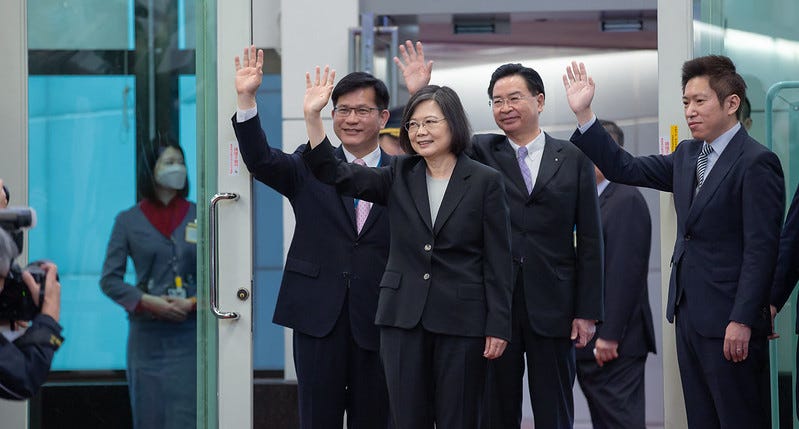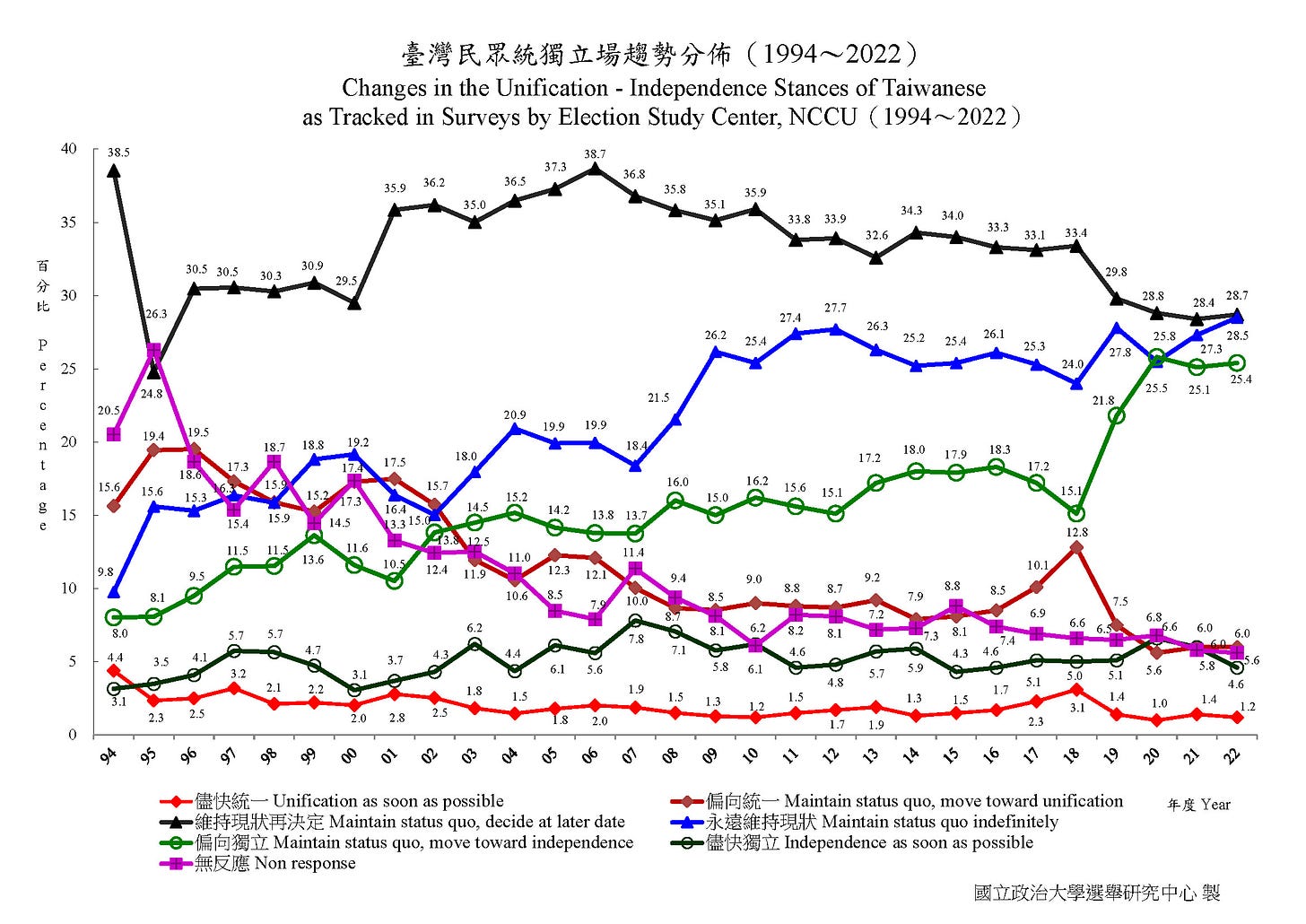Cross-Strait Tensions on Display as Tsai and Ma Embark on Conflicting Trips Abroad
Former Taiwan President Ma Ying-jeou's trip to China puts the question of relations with the mainland front and center as the island nation gears up for its presidential election in January 2024.

In the lead-up to and following a disappointing performance for Taiwan’s ruling Democratic Progressive Party in the 2022 local elections, the future of Taiwan’s stance toward China has been questioned by many observers. The Kuomintang put on an impressive performance in November-December of 2022, winning 14 mayoral/magisterial seats, three of which (Taipei City, Taoyuan City and Keelung City) were gained seats previously held by the DPP. The DPP further lost Hsinchu City to the Taiwan People’s Party, which gained its first mayoral seat with Ann Kao.
Many observers have assessed the DPP’s disappointing performance in the 2022 election to be due to the failure of the party and President Tsai in framing the local elections as a one-issue, China-focused vote. In a disappointing aftermath - where the DPP only gained one Magisterial seat in Penghu County - Tsai resigned as the party’s leader, being replaced by William Lai.
Flash forward to March 2023, Ma Ying-jeou, former President of Taiwan (2008-2016) and KMT Chairman (2005-2007, 2009-2014), touched down in China for a 12-day visit on the 27th. Ma is the first current or former leader of Taiwan to set foot in China since the conclusion of the Chinese Civil War in 1949. This is Ma’s second history-making engagement with China, as he became the first Taiwanese leader to meet with a leader of China since the Chinese Civil War when he met and shook hands with Xi Jinping in Singapore in 2015.
This time around, Ma’s itinerary includes visits to Nanjing, Shanghai, Wuhan, Changsha and Chongqing with a delegation which includes some 30 or so Taiwanese university students. In Wuhan, Ma met with Song Tao, head of China’s Taiwan Affairs Office in Wuhan on March 30. It was here that the former president said the two nations must “maintain exchanges, cooperate together, and do everything possible to avoid war and conflict." Writing for The Diplomat, Hemant Adlakha notes that both the Communist Party of China and the Kuomintang have been careful to avoid casting Ma’s trip as a political exercise.
However, Ma’s visit has been controversial both in China and in Taiwan, and such a visit is not necessarily indicative of popular enthusiasm for warmer Cross-Strait relations.
Taiwanese Public Remains Skeptical of China
According the the Election Study Center at National Chengchi University in Taiwan, at the end of 2022, some 28.7% of Taiwanese feel maintaining the status quo between China and Taiwan is most important, with a resolution to be determined at a later time. Similarly, 28.5% of Taiwanese reported as happy to maintain the status quo indefinitely, not necessarily desiring a decision at any time in the future vs. sometime in the future.
Meanwhile, 25.4% of Taiwanese favored maintaining the status quo, but moving toward independence. The percentage of the population that favored urgent reunification was only 1.2%, while those who favored maintaining the status quo while working toward reunification only counted in at 6.0%. Most interestingly, those who favored urgent independence numbered only 4.6%.
It would seem the most pressing concern for the Taiwanese people is sustained stability, rather than a politically motivated end of independence or reunification.
These findings are largely in line with the outcome of the 2022 local elections, where the DPP under-performed despite priority being given to the China question in the run-up to the election, with one being free to reasonably assume that local elections - the candidates of which having no official hand in Cross-Strait policy - will be swayed more by domestic issues such as housing, crime, etc. Hilton Yip, writing for Foreign Policy, has noted that the long-standing concern about China among Taiwanese voters may have contributed to the DPP’s loss; namely, voters who are already concerned about China will eventually expect the government to address issues outside of the Cross-Strait situation.
Meanwhile, Mei-chuan Wei of the University of Nottingham’s Taiwan Insight, an online magazine operated by the University’s Taiwan Studies Programme, reiterates that because the KMT is often understood as “the standard bearer of the ‘pro-unification’ position on cross-Strait relations,” they were able to leverage focus on domestic issues to gain sway with voters who have been hearing the “stand up to China” message since Tsai Ing-wen’s election to the presidency in 2016.
Tsai Ing-wen Stops in United States en Route to South America
Tsai Ing-wen departed Taiwan on Wednesday, March 29 for a 10-day international trip to Guatemala and Belize in the aftermath of the second diplomatic coup of the month for China, in which Honduras switched international recognition from Taiwan to China on March 26, though the coming switch was expected in advance and Taiwan recalled its ambassador to Honduras on March 23.
Controversially, President Tsai’s trip is bookended by stops in New York and Los Angeles, respectively. Word has it that Tsai may be meeting with Speaker of the United States House of Representatives Kevin McCarthy, drawing memories of then-speaker Nancy Pelosi’s August 2022 visit to the island nation, which elicited a furious response from Beijing. While Taiwanese leaders transiting the United States is nothing new, meetings with high-level US officials the calibre of McCarthy were distant memories until Pelosi’s 2022 arrival. Nonetheless, the response to be expected from Beijing is far from clear.
President Tsai arrived in New York on Wednesday, March 29 and was expected to stay two nights before heading to Guatemala on Friday, March 31. She is then expected to stop in Los Angeles on April 4 before returning to Taiwan the following Friday (April 7). Though the trip has been framed by both the US and Taiwan as apolitical in nature, the president kept a full schedule for both days of her stay in New York, and is generally expected to meet with Speaker McCarthy in Los Angeles.
China’s Ministry of Foreign Affairs has commented on the issue with the following remarks:
China firmly opposes any form of official interaction between the US and the Taiwan region. We firmly oppose any visit by leader of the Taiwan authorities to the US in any name or under whatever pretext. And we firmly oppose the US’ having any form of contact with the Taiwan authorities, which violates the one-China principle. China has repeatedly protested to the US side on Tsai’s so-called stopover in the US. Past mistakes do not justify any new mistake. Repeating a mistake does not make it legitimate. The trip is not so much a “transit”, but an attempt to seek breakthroughs and propagate “Taiwan independence”. The issue is not about China overreacting, but the US egregiously conniving at and supporting “Taiwan independence” separatists.
-Mao Ning, Spokesperson - Ministry of Foreign Affairs
Against the backdrop of Pelosi’s visit to Taiwan in 2022 and American president Joe Biden’s repeated remarks that the US will come to the aid of Taiwan should conflict with China arise, one could certainly be forgiven for suspecting that both the US and Taiwan are becoming emboldened in their partnership, much to Beijing’s chagrin.
Being ineligible for election in the coming presidential race, Tsai is not beholden to a campaign platform in her visit to the US, however her administration has sought closer ties with the US since the beginning, even making a controversial phone call to Donald Trump while the latter was president-elect of the US in 2016. Lawmakers in the US, though divided, have shown a fair eagerness to bolster Taiwan ties, as is exemplified by the Taiwan Policy Act of 2022 (S.4428), which is currently making its way through the United States Congress. The bill would, among others, provide $6.5 billion in foreign military aid to Taiwan, while also calling for joint training and exercises between American and Taiwanese forces. The bill likewise aims to promote cultural and economic exchange between the two nations.
Election Looming for Taiwan
Vice President of Taiwan William Lai secured nomination as the DPP’s presidential candidate in March 2023, being the only candidate to register for the party’s primary. Lai has stressed that he will continue Tsai’s policies in the realm of Cross-Strait relations.
While the KMT has yet to put forward a nominee for next year’s presidential race, the Taiwan People’s Party will have its chairman and former Mayor of Taipei, Ko Wen-je in the US in April as the party’s presumptive nominee. Potential KMT contenders include Jaw Shaw-kong, former member of the Legislative Yuan (1987-1991, 1993-1996); and Chang Ya-chung, who contended for the chairmanship of the KMT in 2021.
With an escalating state of tension between the US and China in relation to Taiwan, voters will likely have Cross-Strait relations on their mind when they head to the polls in 2024. Whether the DPP’s hold on power will survive another election remains to be seen, though it remains equally unclear whether Mr. Ma’s March 28 “we are all Chinese” declaration will earn the KMT brownie points or a cold shoulder. However, data from the Pew Research Center suggest that a mere 4% of Taiwanese see themselves as Chinese, while 28% see themselves as both Taiwanese and Chinese, leaving just over two-thirds of the population leaning toward a sole Taiwanese identity.
Thank you for reading The Asia Cable, if you liked our content please share it with the world. We are a growing newsletter, dedicated to providing relevant and insightful content to students and young professionals. Stay tuned for more engaging and informative updates in the future. Until next time!
The views and information contained in this article are the author’s own and do not necessarily reflect those of The Asia Cable.




